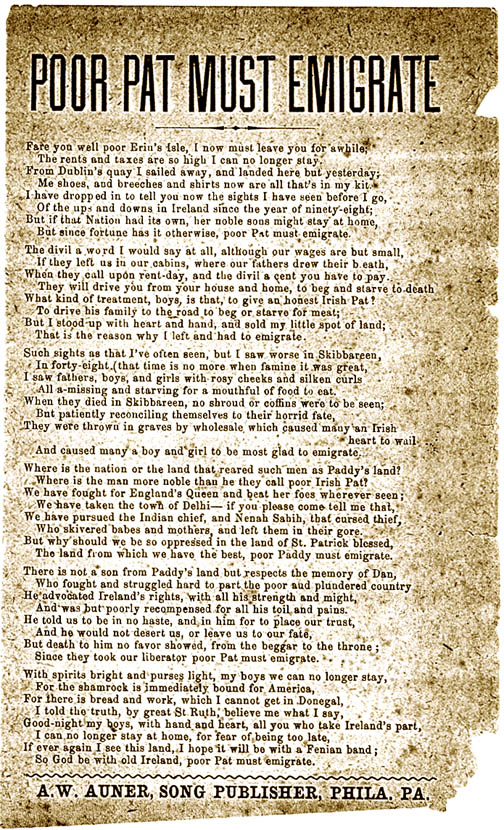
Fare you well poor Erin's Isle, I now must
leave you for awhile;
The rents and taxes are so high I can no longer stay.
From Dublin's quay I sailed away and landed here but
yesterday; Me shoes,
and breeches and shirts now are all that's in my kit
I have dropped in to tell you now the sights I have
seen before I go,
Of the ups and downs in Ireland since the year of
ninety-eight;
But if that Nation had its own, her noble sons might
stay at home,
But since fortune has it otherwise, poor Pat must
emigrate.
The divil a word I would say at all, although our
wages are but small,
If they left us in our cabins, where our fathers drew
their breath,
When they call upon rent-day, and the divil a cent
you have to pay.
They will drive you from your house and home, to beg
and starve to death
What kind of treatment, boys, is that, to give an
honest Irish Pat?
To drive his family to the road to beg or starve for
meat;
But I stood up with heart and hand, and sold my
little spot of land;
That is the reason why I left and had to emigrate.
Such sights as that I've often seen, but I saw worse
in Skibbareen,
In forty-eight (that time is no more when famine it
was great),
I saw fathers, boys, and girls with rosy cheeks and
silken curls
All a-missing and starving for a mouthful of food to
eat.
When they died in Skibbareen, no shroud or coffins
were to be seen;
But patiently reconciling themselves to their horrid
fate,
They were thrown in graves by wholesale which cause
many an Irish heart to wail
And caused many a boy and girl to be most glad to
emigrate.
Where is the nation or the land that reared such men
as Paddy's land?
Where is the man more noble than he they call poor
Irish Pat?
We have fought for England's Queen and beat her foes
wherever seen;
We have taken the town of Delhi—if you please come
tell me that,
We have pursued the Indian chief, and Nenah Sahib,
that cursed thief,
Who skivered babes and mothers, and left them in
their gore.
But why should we be so oppressed in the land of St.
Patrick blessed.
The land from which we have the best, poor Paddy must
emigrate.
There is not a son from Paddy's land but respects the
memory of Dan,
Who fought and struggled hard to part the poor and
plundered country
He advocated Ireland's rights, with all his strength
and might,
And was but poorly recompensed for all his toil and
pains.
He told us to be in no haste, and in him for to place
our trust,
And he would not desert us, or leave us to our fate,
But death to him no favor showed, from the beggar to
the throne;
Since they took our liberator poor Pat must emigrate.
With spirits bright and purses light, my boys we can
no longer stay,
For the shamrock is immediately bound for America,
For there is bread and work, which I cannot get in
Donegal,
I told the truth, by great St. Ruth, believe me what
I say,
Good-night my boys, with hand and heart, all you who
take Ireland's part,
I can no longer stay at home, for fear of being too
late,
If ever again I see this land, I hope it will be with
a Fenian band;
So God be with old Ireland, poor Pat must emigrate.






